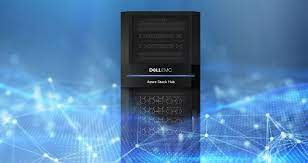

2022/09/27 Microsoft Cloud Solutions 1521 visit(s) 7 min to read
Ctelecoms

Azure Stack is a Microsoft solution that expands Azure solutions and services to data centers, remote offices, and edge locations, providing them the ability to run hybrid applications, in a way that's consistent with running them on Azure.
Dell Integrated System for Microsoft Azure Stack Hub is a fully engineered hybrid cloud platform that is built on hyper-converged infrastructure powered by the latest Dell PowerEdge servers, and provides Microsoft Azure services in your data center and enables connectivity to the Azure public cloud.
The Dell Integrated System for Microsoft Azure Stack Hub (Dell Integrated System) was developed using Microsoft server, networking, security, encryption and application development tools from Dell Technologies. Dell Technologies manages the component lifecycle across the Microsoft Azure Stack Hub platform, ensuring all phases are repeatable and predictable. This robust, all-in-one solution makes the complex simple while delivering the fruits of your IT and digital transformation to your customers.
This solution provides Infrastructure as a Service (IaaS) for rapid provisioning of VM-based workloads. You can also use it to deploy Microsoft SQL, MySQL, and other Platform-as-a-Service (PaaS) offerings to your business. Many of Azure Stack Hub's resource providers match the APIs used in the Azure public cloud. This consistency makes it easier for developers to develop applications. It also facilitates the ability to move workloads between private and public deployment scenarios. Dell Technologies carefully match the capabilities of network and server hardware infrastructure components to the needs of Microsoft Azure Stack Hub. The Dell Integrated System was designed and validated as an integrated solution. It is available for customers using various Microsoft Active Directory authentication providers and public cloud connectivity options.
Dell Technologies Integrated System for Microsoft Azure Stack Hub is a hyper-converged infrastructure appliance from Dell Technologies and Microsoft that enables you to create a hybrid Azure environment. The solution is built on Microsoft Windows 2019, the software-defined storage and networking capabilities of Dell Technologies hyperconverged infrastructure and managed through the Azure Stack Hub interface.
License options are:
All Dell Technologies PowerEdge nodes come with factory activated iDRAC (Integrated Dell Remote Access Controller) Enterprise and Dell Technologies Open Manage Enterprise licenses. Customers only pay only for the Open Manage Network Manager license included with Dell Technologies Integrated System for Azure Stack Hub. In addition, Dell offers its customers flexible payment options depending on the region.
Licensing depends on whether Azure Stack Hub is deployed using a connected (internet connected) or disconnected (no internet connected) model. For connected deployments, customers can choose pay-as-you-go options under either the Microsoft Enterprise Agreement (EA) or Cloud Service Provider (CSP) programs. Disconnected deployments can only use capacity-based EA licenses.
Microsoft's pricing for Azure Stack Hub resources is cheaper than running the same resources in Azure because customers pay an upfront fee to purchase Azure Stack Hub hardware.
We have processes in place to repurpose hardware and keep service contracts intact.
Unlike traditional sizing activities for storage, compute, and network, that based on IOPS, capacity, and hardware specifications, Azure Stack Hub sizing is top-down, starting with an understanding of the customer's use case. Once you've determined the use case, you need to understand which applications to install or which existing workloads to migrate to Azure Stack Hub infrastructure. Workloads can include IaaS or PaaS services.
Azure Stack cannot virtualize external storage, but Azure Stack tenants can use external storage as IP endpoints. For example, applications can use Isilon systems or other NAS (Network Attached Storage) as IP endpoints via CIFS, NFS, etc. Applications can also use Dell Technologies ECS if they use the supported object APIs. In addition, Dell Technologies Integrated System for Azure Stack customers can manage their Isilon systems from the Azure Stack portal using the vConnect plugin.
Finally, Azure Stack Hub can currently scale up to 16 nodes within a scale unit. In the future, it will be possible to add more scaling units per region (currently on Microsoft's roadmap).
We, as a Dell Technologies Gold Partner, are ready to advise, implement and manage all Dell Technologies solutions, delivering an even greater level of service to delight our customers in the kingdom.
Contacts us for more information